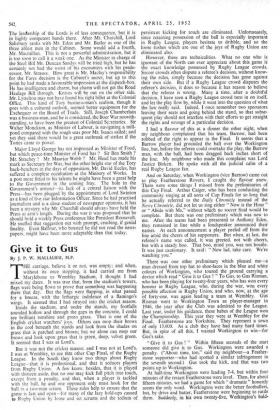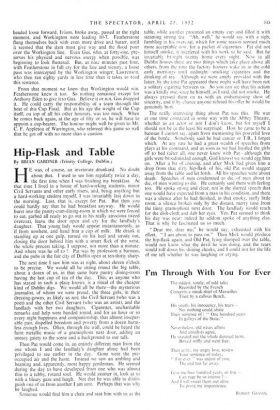Give it to Gus
By J. P. W. MALLALIEU, M.P.
THE carriage, believe it or not, was empty; and when, without its once stopping, it had carried me from Marylebone to Wembley Stadium, I thought I had mixed my dates. It was true that, from the stadium's towers, flags were being flown to prove that something was happening there that day. But the flags were flapping, in what passed for a breeze, with the lethargic indolence of a flamingo's wings. It seemed that I had strayed into the cricket season. Inside the stadium, and under the stands, my footfalls sounded hollow and through the gaps in the concrete, I could see brilliant sunshine and green grass. That is one of the English cricket watchers' joys. Others can mop their brows in the cool beneath the stands and look from the shades on grass that is parched and brown; but we alone can mop our brows and look upon grass that is green, deep, velvet green. It seemed that I was at Lord's.
But it was not the cricket season; and I was not at Lord's. I was at Wembley, to see that other Cup Final, of the Rugby League. In the South they know two things about Rugby League—that it is professional, and that it seduces players from Rugby Union. A few know, besides, that it is played with thirteen aside, that no one may kick full pitch into touch, except from a penalty, and that, when a player is tackled with the ball, he and one opponent only must hook for the ball in a two-man scrum. These rules help to ensure that the game is fast and open—for many of the lazy hold-ups caused in Rugby Union by loose and set scrums and the tedium of persistent kicking for touch are eliminated. Unfortunately, since retaining possession of the ball is especially important in Rugby League, players hesitate to dribble, and so the loose rushes which are one of the joys of Rugby Union are eliminated also.
However, these are technicalities. What no one who is ignorant of the North can ever appreciate about this game is the exact knowledge possessed by Rugby League crowds. Soccer crowds often dispute a referee's decision, without know- ing the rules, simply because the decision has gone against their own side. But if a Rugby League crowd disputes the referee's decision, it does so because it has reason to believe that the referee is wrong. Many a time, after a doubtful decision, I have seen a Rugby League crowd turn in on itself, and let the play flow by, while it went into the question of what the law really said. Indeed, I onca remember two spectators leaving their seats and going behind the stand, so that subse- quent play should not interfere with their efforts to get straight the rights and wrongs of a particular decision.
I had a flavour of this at a dinner the other night, when my neighbour complained that his team, Barrow, had been robbed of the right to appear in the Final. It seems that a Barrow player had grounded the ball over the Workington line, but, before the referee could overtake the play, the Barrow man, with the ball, had been dragged back inches short of the line. My neighbour who made this complaint was Lord Justice Birkett. He spoke with all the judicial calm of a real Rugby League fan.
And on Saturday, when Workington (vice Barrow) came out to play Featherstone Rovers, I caught the flavour anew. There were some things I missed from the preliminaries of this Cup Final. Arthur Caiger, who has been conducting the community singing at all sorts of Cup Finals for so long that he actually referred to the Daily Chronicle instead of the News Chronicle, did not let us sing either " Now is the Hour " or " Abide with Me," without which no soccer final would be complete. But there was one preliminary which was new to me. After the teams had been presented to Anthony Eden, they remained in line while a loudspeaker announced their names. At each announcement a player peeled off from the line amid the cheers of his supporters. But when, at last, the referee's name was called, it was greeted, not with cheers, but with a steady boo. That boo, mind you, was not hostile. It was just cautionary. It said : " Now lad, take care. We're watching you."
There was one other preliminary which pleased me—a man dressed from top hat to shoe-laces in the blue and white colours of Workington, who toured the ground carrying a device which read " Give it to Gus ! " To Gus, to Gus Risman, who has been playing for twenty-four years, who has won every honour in Rugby League, who, during the war, won every possible affection in Rugby Union, and who, now, at the age of forty-one, was again leading a team at Wembley. Gus Risman went to Workington Town as player-manager in 1946, the year after the Club was admitted to the League. Last year, under his guidance, these babes of the League won the Championship. This year they were at Wembley for the Final. Featherstone are Yorkshire. They represent a town of only 13,000. As a club they have had many hard times. But, in spite of all this, I wanted Workington to win—for Gus's sake.
" Give it to Gus ! " Within fifteen seconds of the start someone did give it to Gus. Workington were awarded a penalty. ("About time, too," said my neighbour—a Feather- stone supporter—who had spotted a similar infringement in the seventh second.) Gus took the kick, and that was two points up to Workington. At half-time Workington were leading 7-4, but within four minutes of the restart Featherstone were level. Then, for about fifteen minutes, we had a game for which " dramatic " honestly seems the only word. Workington were the better footballers, but, by drive and batter, Featherstone were beginning to rattle them. Suddenly, in his own -twenty-five, Workington's bald-
headed loose forward, Ivison, broke away, passed at the right moment, and Workington were leading 10-7. Featherstone flung themselves back with even more drive and batter, until it seemed that the dam must give way and the flood pour over the Workington line. Even Gus, who, at forty-one, pre- serves his physical and nervous energy when possible, was beginning to look flustered. But, at nine minutes past four, with Featherstone in full cry for the line and victory, a loose pass was intercepted by the Workington winger, Lawrenson, who then ran eighty yards in less time than it takes to read this sentence.
From that moment we knew that Workington would win. Featherstone knew it too. So nothing remained except for Anthony Eden to give it to Gus. Believe it or not, Gus dropped it. He could carry the responsibility of a team through the heat of this Cup Final. But at his age the weight of the Cup itself, on top of all his other honours, was too much. When he comes back again, at the age of fifty or so, he will have to appoint a cup-bearer. The honour might well be given to Mr. C. F. Appleton of Warrington, who refereed this game so well that he got off with no more than a caution.



































 Previous page
Previous page